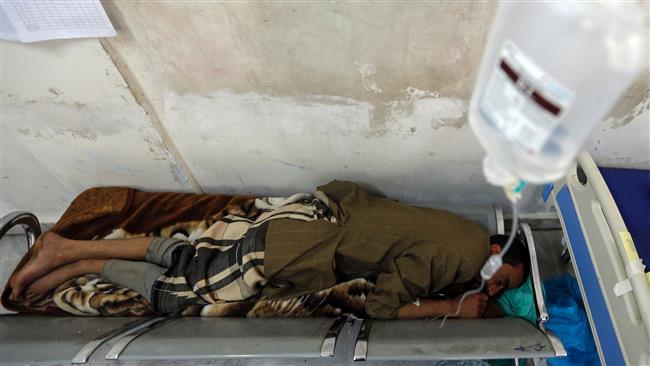
RNA - "After military and political failures in Yemen, Riyadh spread cholera in Yemen intentionally," Sharaf was quoted as saying by Ta'iz news website on Sunday.
Stressing that the Yemenis will not forget the Saudis' crimes, he said that Riyadh's dreams will not come true even if they resort to ground and air assaults and siege against Yemen and spreading infectious diseases like cholera.
In relevant remarks earlier this month, Yemen’s former President, Ali Abdullah Saleh, singled out Riyadh as the source of cholera outbreak.
The Russia Today Arabic news channel quoted Saleh as saying that the Saudi-led coalition was behind the spread of the highly contagious disease through the use of internationally banned weapons.
"The coalition is using devastating weapons such as cluster and thermobaric bombs which leave very harmful effects for the people of Yemen," he added.
Saleh held the US, Britain and Israel to account, saying they are complicit in the "massacre of children and destruction of our homes" through supporting Saudi Arabia.
The World Health Organization (WHO) announced that a cholera epidemic has killed over 1,500 people in Yemen since late April as the war-torn country is facing the "world's worst cholera outbreak", warning that as many as 300,000 could get infected by the end of August.
The country's Health Ministry has already announced that 21 of a total 22 Yemeni provinces are threatened by the disease. On mid-May, it also declared a state of emergency in the capital Sana'a in connection with the epidemic.
The WHO has also estimated that 7.6 million Yemenis live in areas with a high risk of cholera transmission.
Saudi Arabia has been striking Yemen since March 2015 to restore power to fugitive president Mansour Hadi, a close ally of Riyadh. The Saudi-led aggression has so far killed at least 14,000 Yemenis, including hundreds of women and children.
Despite Riyadh's claims that it is bombing the positions of the Ansarullah fighters, Saudi bombers are flattening residential areas and civilian infrastructures.
According to several reports, the Saudi-led air campaign against Yemen has drove the impoverished country towards humanitarian disaster.
Nearly 3.3 million Yemeni people, including 2.1 million children, are currently suffering from acute malnutrition. The Al-Saud aggression has also taken a heavy toll on the country’s facilities and infrastructure, destroying many hospitals, schools, and factories.
The WHO now classifies Yemen as one of the worst humanitarian emergencies in the world alongside Syria, South Sudan, Nigeria and Iraq.
847/940